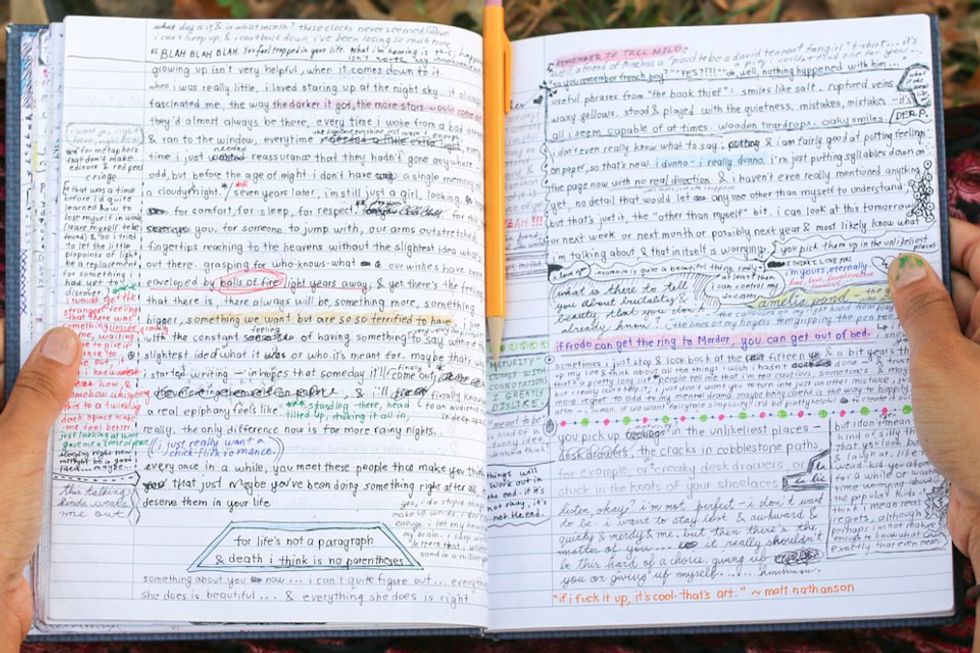For as long as I’ve been able to write, I’ve kept a journal. There are lots of gaps, of course—sometimes days, sometimes months, sometimes a year or two—when I forget or can’t get myself to write. I’ve had lots of different kinds of journals over the years, from the standard notebook to the infamous Password Journal, from failed attempts at photo journals to fancy Moleskins (though I’ve yet to try the recent trend of bullet journaling). There are endless ways to do it, but at the end of the day, it’s about getting your thoughts out of your head and onto the pages.
I hadn’t given a lot of thought to why I kept a journal, other than the fact that I want to be a writer and journaling is a sure-fire way to improve writing skills, until my junior year of high school when I read an essay by Henry David Thoreau about the benefits of keeping a journal. After a little more research and thought, I found that there are so many benefits to journaling, and I think everyone should experience them.
So, why should you keep a journal?
1. It's good for you.
There is scientific evidence that journaling benefits your physical health . Experts believe that when you write about the stressful events in your life, it helps you work through them, and so the toll that stress takes on your body is lessened. For example, it’s been shown to strengthen immune cells and, in some cases, even decrease the symptoms of asthma and rheumatoid arthritis.
2. Journaling helps you decide what you think.
When you write about things in your life, you’re forced to put them into words. It forces you to decide how you feel about situations, even if it’s that you don’t know. I’ve found that this act of putting events and feelings into words helps me develop my worldview, and it allows me to have better control and understanding of who I am as a person. As writer Susan Sontag put it, “In the journal I do not just express myself more openly than I could do to any person; I create myself.”
There are lots of other benefits to this aspect of journaling, like better communication skills. Once you’ve put your thoughts into words on paper, it’s easier to find the right words to talk about them.
Also, it helps integrate things you’ve learned into your worldview and who you are. For example, when you “take notes” on your life, in a way, and write down what you thought of things you’ve read or sermons you’ve heard, you’ll remember those things longer.3. You can "let it all out."
This is one of the most common reasons people keep a journal. Journaling can be a way to express thoughts about situations you can’t talk about or work through stressful events in your life. One writer puts it this way: “I can yell in my journal and no one will hear me raise my voice.” Many people find it therapeutic to write what they really think about things in their life, while in “real life,” they can’t exactly say those things. This aspect of journaling helps you keep control over your emotions. Once you’ve written down your feelings, it takes away that edge of needing to talk about them.
4. You can read back over them in the future.
Another one of the most common reasons people keep a journal is to relive important parts of their lives in the future. Thoreau says journaling should not just be to analyze our thoughts but to “make an accurate transcript of them.” I think journals are like photo albums for your thoughts. Memories fade, but when you document them, you can relive them whenever you want. Reading through old journals is not only fun—though sometimes embarrassing—but it also allows you to see patterns in your thoughts and how much you’ve grown as a person over the years. In this way, journals are priceless.
In a larger, more remote sense, writing in a journal allows you to write yourself into history. Historians often use journals to fill in the cultural gaps in history. For example, although women in most societies were not given much of a voice historically, because they kept journals, we are able to know more about them than should have been “allowed.” They gave themselves a voice when no one else would.
Although that’s not a direct benefit to you, and there’s no guarantee some historian will read your journals, the concept is what’s important. It’s important to tell your stories, and it’s important to give yourself a voice. What you have to say matters more than you think it does. It matters for your own benefit, especially, and possibly the benefit of others. Take this quote from arguably the most famous and influential journal of all time, the Diary of Anne Frank:
“For someone like me, it is a very strange habit to write in a diary. Not only that I have never written before, but it strikes me that later neither I, nor anyone else, will care for the outpouring of a 13-year-old schoolgirl.”
What you have to say matters. Journaling your thoughts takes stress off your life, helps you shape your worldview and who you are as a person, helps you control and understand your emotions, and chronicles your life and thoughts so you can relive your days long after the memories have faded.
Your stories are important. Your thoughts are important. So write them.



















